Introduction: A Growing Interest in Mushrooms for Cognitive and Liver Health
In recent years, there has been a remarkable surge in public and scientific interest in natural remedies and nutritional interventions that support brain health, cognitive function, and liver wellness. Among these, nootropic mushrooms have gained significant attention due to their dual action in enhancing mental performance while offering protective and restorative benefits for vital organs like the liver. The best mushroom for fatty liver, in particular, has become a focal point of contemporary health research and integrative nutrition, especially as the prevalence of non-alcoholic fatty liver disease (NAFLD) continues to rise globally.
Fatty liver, a condition marked by excess fat accumulation in liver cells, can silently impair liver function and increase the risk of inflammation, fibrosis, and metabolic dysfunction. As a result, there is a growing demand for natural, safe, and effective interventions that can both protect hepatic health and enhance cognitive resilience. Enter the world of nootropic mushrooms—a class of fungi celebrated not only for their neuroprotective potential but also for their remarkable hepatoprotective properties. In this article, we delve deep into the science and tradition behind these intelligent fungi, uncovering how the best mushroom for fatty liver may offer transformative benefits across body and mind.
You may also like: The Ultimate Guide to the Best Nootropic Mushrooms for Memory and Cognitive Enhancement

Understanding Nootropic Mushrooms: Ancient Wisdom Meets Modern Neuroscience
Nootropic mushrooms are a unique subset of fungi revered for their cognitive-enhancing properties. Historically used in Traditional Chinese Medicine (TCM), Ayurveda, and indigenous healing systems, these mushrooms were cherished not only as food but also as potent elixirs for mental clarity, memory, mood regulation, and overall vitality. Modern neuroscience has begun to validate many of these ancient claims, with emerging research highlighting their role in neurogenesis, synaptic plasticity, oxidative stress reduction, and inflammation control.
Lion’s mane (Hericium erinaceus), for example, is a well-known nootropic mushroom praised for its ability to stimulate nerve growth factor (NGF) production, essential for the maintenance and repair of neurons. Reishi (Ganoderma lucidum) and Cordyceps (Cordyceps militaris) are also frequently cited for their adaptogenic qualities, helping the body manage stress while modulating immune responses. These cognitive benefits do not exist in isolation. The very compounds that enhance brain function—such as beta-glucans, hericenones, erinacines, and polysaccharides—often exert broader systemic effects, including liver protection, detoxification support, and anti-inflammatory actions.
As we explore the interface between cognition and hepatic function, it becomes increasingly clear that what benefits the brain often benefits the liver—and vice versa. Understanding how nootropic mushrooms operate across these two domains opens up new possibilities for integrated approaches to health and wellness.
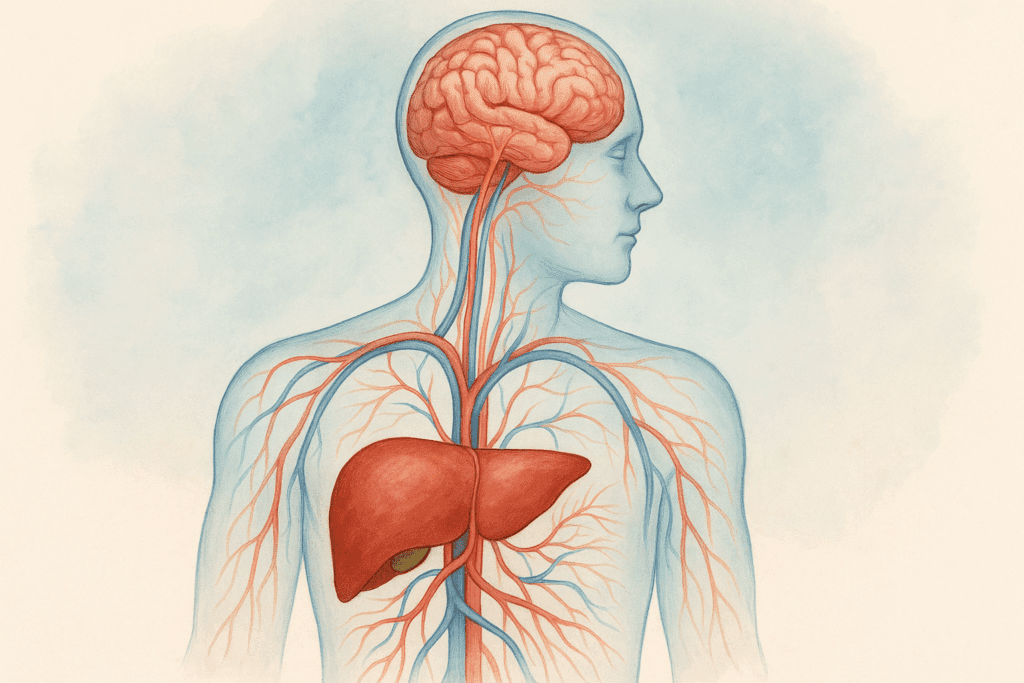
The Liver-Brain Connection: Why Cognitive Health and Liver Function Are Interlinked
The concept of a liver-brain connection may initially seem surprising, but a growing body of evidence supports the interdependence of these two organs. The liver plays a central role in metabolism, detoxification, and nutrient processing—all of which have downstream effects on cognitive function. For instance, the liver regulates blood glucose levels, synthesizes essential fatty acids and cholesterol (critical for brain cell membranes), and filters toxins that could otherwise accumulate and impair neurological health.
Conversely, a compromised liver can lead to systemic inflammation, elevated ammonia levels, and oxidative stress, all of which are known contributors to cognitive decline. Patients with advanced liver disease often exhibit signs of hepatic encephalopathy—a condition characterized by confusion, memory lapses, and poor concentration due to accumulated toxins in the brain. Even in milder forms, fatty liver can indirectly impair mental performance by disrupting metabolic homeostasis and increasing the body’s inflammatory burden.
Therefore, supporting liver function is not merely a matter of digestive health; it is a foundational pillar of cognitive well-being. This dual focus makes nootropic mushrooms particularly compelling, as they offer tools to nurture both the mind and the liver through shared biochemical pathways and holistic physiological benefits.
Mushrooms and Liver Health: An Overview of Hepatoprotective Fungi
In the realm of functional fungi, certain species stand out for their hepatoprotective properties. These mushrooms contain bioactive compounds that can help reduce liver fat accumulation, combat oxidative stress, and promote liver cell regeneration. Some also support bile production and facilitate the removal of toxins from the body. As a result, they are increasingly being studied and used in complementary approaches to managing fatty liver conditions.
Reishi mushroom is a prime example. Often called the “mushroom of immortality,” Reishi has demonstrated significant liver-protective effects in preclinical studies. It contains triterpenoids and polysaccharides that reduce inflammation, inhibit fibrosis, and enhance antioxidant activity in liver tissues. Reishi is especially beneficial in cases of chronic liver stress or damage caused by alcohol, medication, or metabolic overload.
Cordyceps, known for boosting energy and athletic performance, also supports liver function by improving mitochondrial efficiency and reducing lipid peroxidation. Studies suggest that Cordyceps supplementation can lower liver enzyme levels and improve markers of hepatic health in individuals with metabolic syndrome or NAFLD. Meanwhile, Shiitake (Lentinula edodes) contains eritadenine and beta-glucans that help regulate cholesterol levels and support liver detoxification.
These findings underscore the broader value of mushrooms for liver health, setting the stage for identifying which specific varieties might be considered the best mushroom for fatty liver based on current scientific understanding.
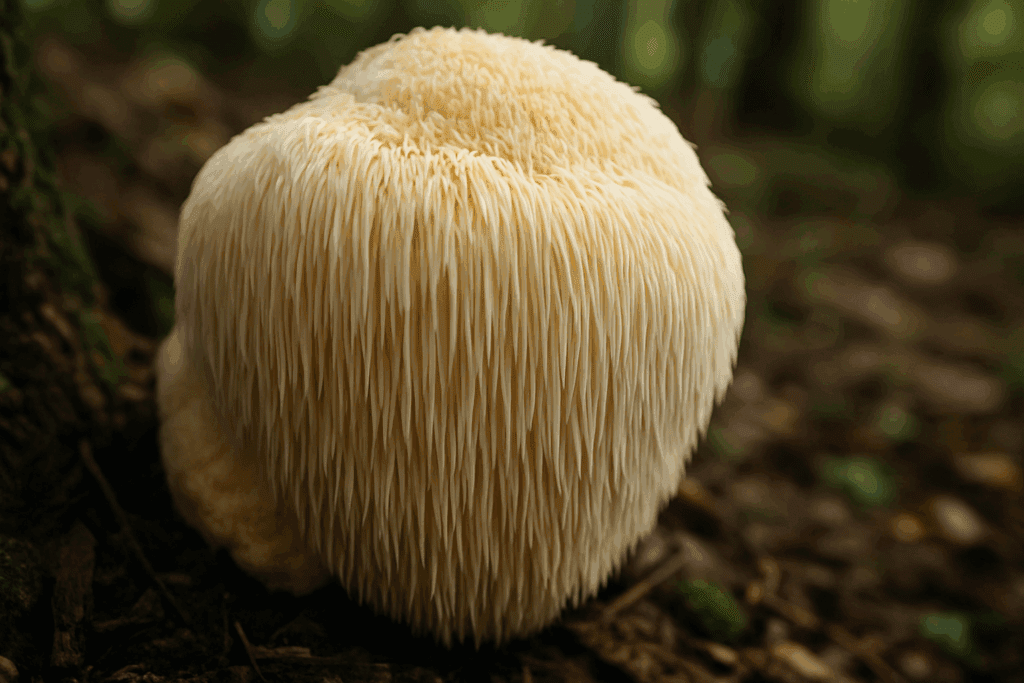
The Best Mushroom for Fatty Liver: A Closer Look at Lion’s Mane
While many mushrooms contribute to liver wellness, Lion’s Mane emerges as a particularly promising candidate when evaluating the best mushroom for fatty liver. This shaggy, white fungus, resembling a lion’s mane in appearance, is rich in hericenones and erinacines—compounds known to stimulate nerve regeneration and reduce neuroinflammation. However, Lion’s Mane’s benefits extend far beyond the nervous system.
Recent studies have begun to explore Lion’s Mane’s impact on metabolic health, showing that it can help lower triglyceride levels, improve insulin sensitivity, and reduce body fat—all of which are key risk factors for fatty liver disease. Its anti-inflammatory and antioxidant properties help mitigate the oxidative stress that often exacerbates hepatic fat accumulation and fibrosis. Furthermore, Lion’s Mane may modulate the gut microbiota in ways that benefit both the liver and the brain, fostering a healthier gut-liver-brain axis.
The mushroom’s unique ability to influence lipid metabolism makes it a powerful ally in the fight against fatty liver. By improving the body’s capacity to process and eliminate excess fat, Lion’s Mane supports a leaner, more resilient hepatic system. When combined with its cognitive-boosting effects, this makes Lion’s Mane a standout in the category of mushrooms good for liver health and mental clarity alike.
Exploring Reishi as the Best Mushroom for Fatty Liver and Immune Modulation
Another strong contender for the title of best mushroom for fatty liver is Reishi, whose wide-ranging effects on immune function, inflammation, and hepatic repair make it a favorite among practitioners of integrative medicine. Unlike Lion’s Mane, which primarily acts on neural pathways, Reishi exerts its influence through the immune system, helping to regulate cytokine activity, suppress fibrotic pathways, and enhance liver detoxification enzymes.
Reishi’s triterpenes have shown the ability to downregulate fibrotic markers such as TGF-β1 and alpha-SMA in liver tissues, suggesting a protective role against the progression of NAFLD to more severe conditions like non-alcoholic steatohepatitis (NASH) and cirrhosis. At the same time, its polysaccharides support macrophage activity, modulate T-cell responses, and promote the repair of damaged liver cells.
Perhaps most impressively, Reishi appears to improve metabolic parameters related to liver health, including fasting glucose, LDL cholesterol, and inflammatory biomarkers. This makes it a valuable adjunct in lifestyle-based interventions for fatty liver, particularly in individuals struggling with insulin resistance or metabolic syndrome. In sum, Reishi offers a multifaceted approach to hepatic wellness, earning its place in discussions about mushrooms for liver health and systemic balance.
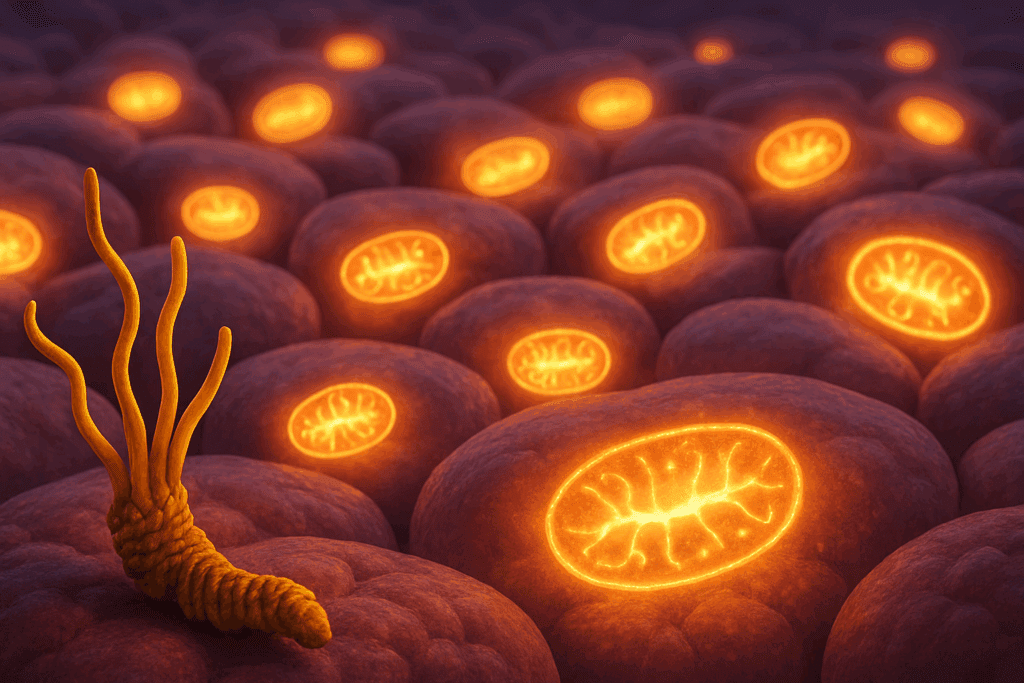
Cordyceps and Mitochondrial Function: Enhancing Energy and Liver Efficiency
Cordyceps, a genus of parasitic fungi known for its striking lifecycle and potent adaptogenic effects, has been used for centuries to improve vitality, stamina, and respiratory function. But beyond its energizing reputation lies a sophisticated mechanism of action that makes Cordyceps uniquely suited to support liver function and metabolic resilience.
At the cellular level, Cordyceps enhances mitochondrial biogenesis and ATP production, helping cells generate more energy with less oxidative stress. This is particularly important in the liver, which houses a high concentration of mitochondria to fuel its extensive metabolic duties. By improving mitochondrial efficiency, Cordyceps helps the liver break down fats more effectively, reducing the risk of steatosis (fat accumulation) and promoting a cleaner, more efficient detoxification process.
Research in animal models has shown that Cordyceps supplementation can reduce liver enzymes, improve antioxidant status, and normalize lipid profiles. Its effects on AMPK signaling pathways suggest potential benefits for insulin sensitivity and fatty acid oxidation, both critical for preventing and reversing fatty liver. As such, Cordyceps may not only serve as a physical performance enhancer but also as one of the mushrooms good for liver support and long-term metabolic vitality.
Why Mushrooms Good for Liver Health Also Benefit the Brain
One of the most compelling reasons to focus on mushrooms good for liver health is their cascading impact on the brain. The biochemical harmony between the liver and the central nervous system means that any intervention that reduces hepatic inflammation, oxidative stress, or metabolic imbalance will likely confer cognitive benefits as well. This dual-action is a hallmark of nootropic mushrooms, which seem to possess an uncanny ability to heal multiple systems simultaneously.
For example, the anti-inflammatory properties of mushrooms like Reishi and Cordyceps not only reduce hepatic cytokine activity but also quell neuroinflammation, a key driver of brain fog, anxiety, and neurodegeneration. Likewise, antioxidants found in Lion’s Mane help protect both hepatocytes and neurons from free radical damage, preserving cellular integrity and function.
This synergy is particularly valuable for individuals dealing with conditions like NAFLD, which is often associated with fatigue, depression, and cognitive sluggishness. By targeting the root causes of these symptoms—inflammation, oxidative stress, and metabolic dysfunction—nootropic mushrooms provide a comprehensive, whole-body strategy for recovery and optimization.
Practical Strategies for Incorporating Nootropic Mushrooms into Daily Life
Integrating nootropic mushrooms into a daily routine can be both enjoyable and highly beneficial, provided one follows best practices for sourcing, dosage, and preparation. Most nootropic mushrooms are available in various forms, including powders, capsules, tinctures, and even functional beverages like mushroom coffee and tea. Choosing the right format depends on individual preferences, health goals, and lifestyle factors.
For liver support, a dual-extract tincture that combines both water-soluble polysaccharides and alcohol-soluble triterpenes can offer the most comprehensive benefits. These full-spectrum extracts ensure that key bioactive compounds are preserved and bioavailable. For cognitive enhancement, powdered mushrooms blended into smoothies or taken as part of a morning tonic can provide sustained mental clarity without the jittery side effects of stimulants.
It is important to source mushrooms from reputable brands that test for heavy metals, microbial contamination, and mycotoxins, as fungi can easily absorb pollutants from their growing environment. Ideally, mushrooms should be organically grown, third-party tested, and harvested at the appropriate stage of maturity to maximize their therapeutic potential.
Dosage recommendations vary depending on the species and form, but most experts suggest starting with a lower dose (e.g., 500 mg to 1 g per day) and gradually increasing as tolerated. Consultation with a healthcare provider familiar with integrative or functional medicine can help personalize the approach and monitor progress.
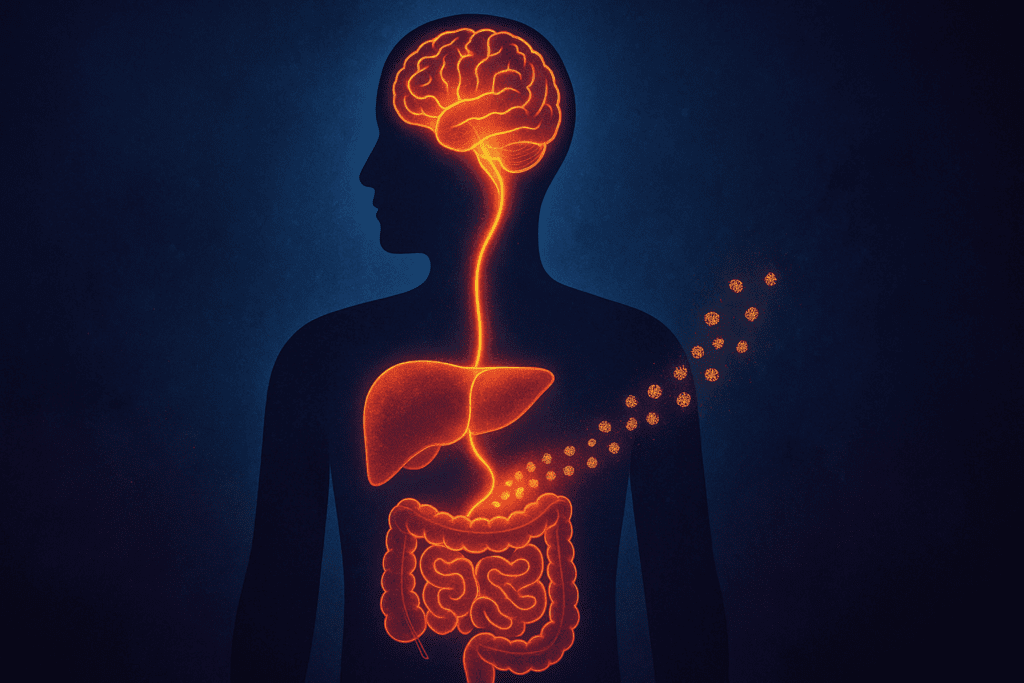
The Gut-Liver-Brain Axis: A Hidden Pathway of Mushroom Efficacy
A fascinating yet often overlooked aspect of mushroom therapy involves the gut-liver-brain axis—a complex communication network linking microbial activity in the intestines with systemic inflammation, hepatic metabolism, and neurological health. Nootropic mushrooms, rich in prebiotic polysaccharides and immunomodulatory compounds, can positively influence the gut microbiome, thereby enhancing the function of both the liver and brain.
When consumed regularly, these mushrooms support the growth of beneficial gut bacteria such as Bifidobacterium and Lactobacillus, which play key roles in maintaining intestinal integrity, regulating immune responses, and reducing endotoxemia. A healthier gut microbiome produces fewer lipopolysaccharides (LPS), which are inflammatory compounds that can damage liver tissues and impair cognitive function.
Moreover, gut-derived short-chain fatty acids (SCFAs), influenced by dietary fiber and prebiotic intake, are known to protect against liver inflammation and support neurotransmitter production. Through this interconnected pathway, nootropic mushrooms offer a triple benefit: enhancing microbial balance, protecting hepatic cells, and elevating mood and cognition. This emerging science adds another layer of credibility to the use of the best mushroom for fatty liver as part of a holistic health regimen.
Emerging Research on Turkey Tail: A Promising Candidate for Fatty Liver Support
As scientific inquiry continues to expand the field of mycotherapy, Turkey Tail (Trametes versicolor) has emerged as a notable contender among mushrooms good for liver health. Known for its colorful concentric rings and shelf-like growth on trees, Turkey Tail has long been recognized in traditional medicine for its immune-enhancing properties. Recent research, however, has begun to illuminate its role in liver health, particularly in the context of fatty liver disease and systemic inflammation.
Turkey Tail contains two unique polysaccharopeptides—PSP (polysaccharopeptide) and PSK (polysaccharide-K)—that have demonstrated immunomodulatory, antioxidant, and anticancer properties. These bioactive compounds may indirectly support liver function by modulating inflammatory pathways and reducing the hepatic oxidative stress that drives fat accumulation. Moreover, Turkey Tail’s prebiotic effects help shape a healthier gut microbiota, further strengthening the gut-liver axis and reducing endotoxin load.
Preclinical studies suggest that Turkey Tail can suppress pro-inflammatory cytokines such as TNF-α and IL-6, while enhancing the activity of antioxidant enzymes like superoxide dismutase and catalase in liver tissues. By mitigating oxidative damage and inflammatory signals, Turkey Tail may help protect liver cells from lipid-induced injury. These protective mechanisms make it a strong candidate for inclusion in formulations aimed at managing non-alcoholic fatty liver disease and related metabolic disturbances.
While human clinical trials are still in their early stages, the cumulative data from animal studies and in vitro analyses present a compelling case for Turkey Tail as one of the best mushrooms for fatty liver. As interest in integrative liver support grows, this mushroom’s multifaceted properties position it as a promising tool in the therapeutic toolkit for chronic liver conditions.
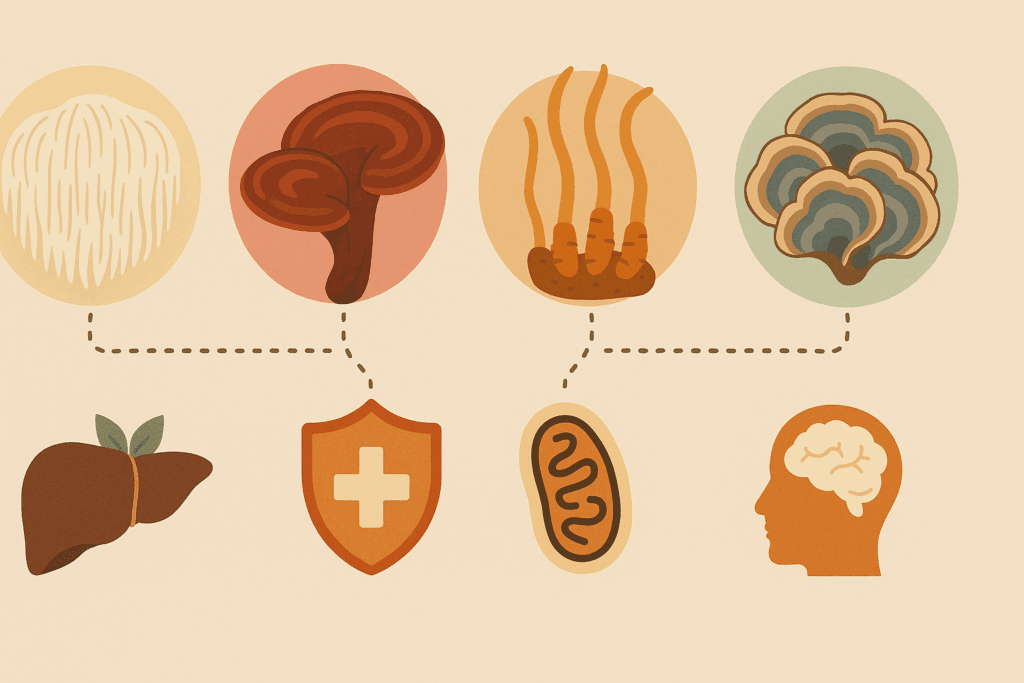
Synergistic Effects: Combining Multiple Mushrooms for Maximum Benefit
Though individual mushrooms offer remarkable benefits on their own, combining multiple nootropic and hepatoprotective fungi may yield synergistic effects that enhance overall efficacy. The use of mushroom blends is increasingly common in functional medicine, where practitioners aim to harness the diverse biochemical profiles of different species to address complex, multifactorial health concerns such as fatty liver disease.
For instance, a formulation that includes Lion’s Mane, Reishi, Cordyceps, and Turkey Tail may target several key aspects of liver dysfunction simultaneously: oxidative stress, inflammation, insulin resistance, lipid accumulation, and impaired mitochondrial function. Lion’s Mane supports neurogenesis and metabolic regulation; Reishi offers immune modulation and antifibrotic effects; Cordyceps enhances mitochondrial energy production; and Turkey Tail strengthens the gut-liver axis while bolstering immune surveillance.
This multi-pronged approach reflects the complexity of the human body, where no single pathway operates in isolation. By using a blend of mushrooms for liver health, individuals can achieve more comprehensive support for hepatic function, especially when these supplements are integrated with dietary modifications, regular physical activity, and stress reduction techniques.
It is important, however, to monitor for potential interactions between mushroom compounds and pharmaceutical medications, particularly those metabolized by the liver. Consulting a healthcare professional knowledgeable in herbal medicine can help tailor a combination strategy that aligns with individual health needs, enhances compliance, and reduces the risk of adverse reactions.
Ultimately, the synergistic use of mushrooms not only amplifies their individual benefits but also mirrors the holistic philosophy of integrative health—one that sees the liver not just as an isolated organ, but as a central hub in the network of mind-body well-being.
Personalized Nutrition: Tailoring Mushroom Supplementation for Liver Health
In the evolving landscape of precision medicine, the concept of personalized nutrition has gained prominence as a way to optimize health outcomes based on individual genetic, metabolic, and lifestyle profiles. This personalized approach extends naturally to the use of nootropic mushrooms for liver support. Not everyone responds the same way to a particular mushroom, and individual needs may vary depending on the stage of fatty liver, underlying health conditions, and concurrent medications.
For individuals in the early stages of fatty liver or those with risk factors like obesity or insulin resistance, Lion’s Mane may be particularly helpful due to its effects on lipid metabolism and glucose regulation. In contrast, for those with immune dysregulation or autoimmune liver conditions, Reishi may offer superior benefits through its immune-balancing effects. Meanwhile, individuals experiencing fatigue and low vitality in the context of liver dysfunction might benefit more from Cordyceps, which enhances mitochondrial energy production.
Tailoring mushroom supplementation also involves adjusting dosages, timing, and delivery formats to suit personal preferences and absorption capabilities. For example, individuals with compromised digestion may absorb tinctures or teas more effectively than capsules. Some may prefer microdosing throughout the day, while others respond better to a single concentrated dose. These nuances underscore the importance of bio-individuality in crafting effective interventions.
Moreover, dietary patterns, gut health, and coexisting nutrient deficiencies can all influence how the body responds to mushroom supplements. Pairing these fungi with liver-supportive nutrients such as choline, taurine, and omega-3 fatty acids can further enhance outcomes. Personalized protocols may also include periodic reassessments and laboratory tests to track improvements in liver enzymes, inflammatory markers, and metabolic metrics over time.
By adopting a personalized nutrition approach to mushroom supplementation, individuals can unlock the full therapeutic potential of these functional fungi while minimizing risks and maximizing sustainability. This tailored strategy honors the complexity of both the human body and the diverse world of medicinal mushrooms.

Integrating Mushrooms into a Holistic Liver Health Protocol
In the pursuit of optimal liver health, no single intervention is sufficient on its own. Rather, a holistic protocol that integrates dietary, lifestyle, and botanical strategies is most likely to yield lasting benefits. Nootropic mushrooms can serve as a cornerstone of such an approach, offering a natural and scientifically supported means of supporting hepatic function, reducing inflammation, and promoting metabolic balance.
Nutrition remains a foundational pillar of liver health. A plant-based, whole-food diet rich in antioxidants, fiber, and phytonutrients helps reduce oxidative stress and supports the body’s detoxification pathways. Incorporating mushrooms into meals—whether as culinary staples or functional extracts—adds both therapeutic value and gastronomic delight. Shiitake, Maitake, and Oyster mushrooms are not only hepatoprotective but also rich in nutrients like selenium, vitamin D, and B-complex vitamins that support liver function.
Physical activity also plays a critical role by improving insulin sensitivity, reducing visceral fat, and enhancing mitochondrial function—all of which contribute to liver health. Exercise also boosts circulation, which facilitates nutrient delivery and waste removal, thereby reducing the liver’s metabolic burden. Stress management techniques such as mindfulness meditation, yoga, and deep breathing exercises can help regulate cortisol levels and prevent the neuroendocrine imbalances that contribute to liver inflammation.
Sleep hygiene is another vital component of liver health, as the liver performs many of its detoxification tasks during the night. Ensuring adequate, high-quality sleep supports circadian regulation of liver enzymes and prevents metabolic dysregulation. Nootropic mushrooms like Reishi can promote relaxation and improve sleep quality, making them a valuable tool in a comprehensive liver support regimen.
Incorporating mushrooms good for liver health into a broader wellness plan allows individuals to address multiple root causes of fatty liver disease simultaneously. This integrative strategy reflects the principles of functional medicine and empowers individuals to take a proactive, personalized role in their healing journey.
Future Directions: What to Expect from Ongoing Research on Mushrooms and Fatty Liver
As interest in medicinal mushrooms continues to surge, so too does the pace of research aimed at uncovering their full potential. While many findings are still based on animal models and preliminary human studies, ongoing clinical trials and mechanistic research promise to deepen our understanding of how these fungi interact with hepatic pathways, immune function, and neurocognitive processes.
One exciting area of exploration involves the genomics of mushroom compounds—how their bioactive constituents influence gene expression in liver cells, particularly in genes related to lipid metabolism, oxidative stress response, and fibrosis. Such insights could pave the way for mushroom-based therapeutics that are targeted to individual genetic profiles, ushering in a new era of personalized fungal medicine.
Another promising direction lies in the development of novel delivery systems that enhance the bioavailability and potency of mushroom extracts. Liposomal encapsulation, nanoemulsion technologies, and fermented formulations are being tested to improve absorption and efficacy. These innovations may allow for lower doses, greater compliance, and more consistent results across diverse populations.
Collaborative studies between Western biomedical institutions and traditional medicine practitioners are also shedding light on time-tested herbal combinations, dosage patterns, and synergistic effects. As cultural and scientific paradigms merge, the therapeutic landscape for mushrooms for liver health is expanding in ways that honor both empirical wisdom and empirical evidence.
Importantly, future research will likely address the long-term safety, optimal duration of use, and potential interactions of mushroom supplements in populations with chronic liver disease, diabetes, and neurodegenerative disorders. These studies will be essential for establishing standardized protocols and clinical guidelines that can inform healthcare practices worldwide.
In sum, the future of mushrooms good for liver health and cognitive enhancement looks exceedingly bright. As we move toward more integrative and individualized approaches to wellness, these functional fungi are poised to play a central role in preventing and reversing some of the most pervasive health challenges of our time.
Expert FAQ on Nootropic Mushrooms and Liver Health
1. What makes the best mushroom for fatty liver more effective than other natural remedies?
The best mushroom for fatty liver offers a combination of bioactive compounds that go beyond simple antioxidants or detox agents. These mushrooms contain beta-glucans, triterpenes, and ergothioneine that specifically target hepatic inflammation, improve lipid metabolism, and modulate gene expression in liver cells. Unlike many herbal remedies that work in isolated pathways, functional mushrooms often exert multi-pathway actions—addressing oxidative stress, insulin sensitivity, and immune regulation simultaneously. This makes them particularly useful for complex conditions like non-alcoholic fatty liver disease (NAFLD). Their adaptogenic nature also helps stabilize systemic responses to stress, which indirectly supports liver health.
2. Are there specific lifestyle changes that enhance the effects of mushrooms for liver health?
Absolutely. Incorporating mushrooms for liver health into your daily regimen works best when paired with consistent lifestyle habits. Regular aerobic exercise improves liver insulin sensitivity and enhances mitochondrial function, making it easier for the liver to process fats. A diet rich in cruciferous vegetables, whole grains, and fermented foods can synergize with the prebiotic effects of mushrooms like Turkey Tail. Moreover, staying hydrated and practicing mindfulness techniques helps mitigate cortisol-driven liver inflammation. The effectiveness of mushrooms is greatly amplified when these holistic strategies are embraced together.
3. Can the best mushroom for fatty liver support mental clarity in addition to liver health?
Yes, the cognitive-liver synergy is a defining strength of the best mushroom for fatty liver. Lion’s Mane, for example, has shown the ability to regenerate nerve growth factors, which support memory, focus, and emotional regulation. When liver function improves, so does the body’s ability to regulate blood glucose and reduce neuroinflammation, both of which affect mental sharpness. Moreover, mushrooms good for liver and brain health often help correct dysbiosis in the gut—another key player in cognitive function through the gut-brain axis. This dual-action capability is why these mushrooms are often favored in both neurological and hepatological protocols.
4. How do mushrooms good for liver health compare to pharmaceutical interventions?
Mushrooms good for liver health provide a gentler, multifaceted approach compared to pharmaceutical options, which often target specific enzymes or metabolic pathways. While medications like statins or insulin sensitizers can provide quick results, they may also introduce side effects or require ongoing dosage adjustments. Functional mushrooms, on the other hand, support homeostasis and allow the body to regulate its own biochemical processes more naturally. They also improve gut microbiota balance and reduce systemic inflammation without damaging organ tissues. That said, they should be seen as complementary rather than substitute therapies, especially for those with advanced liver disease.
5. Is there an optimal time of day to consume mushrooms for liver health?
The timing of mushroom supplementation can influence its effectiveness. For example, consuming Reishi in the evening is ideal due to its calming properties, which may aid sleep and enhance overnight liver detoxification. Lion’s Mane and Cordyceps, being more energizing, are better taken in the morning to support cognitive function and metabolic activity. Additionally, taking mushrooms with a meal that includes healthy fats can enhance the absorption of fat-soluble compounds like triterpenes. Consistency is key, so maintaining a routine that aligns with your natural circadian rhythms and lifestyle is the most effective approach.
6. What are some underappreciated mushrooms that support liver function?
Beyond the popular options, several lesser-known mushrooms also offer compelling benefits for liver health. Agaricus blazei Murill has shown promise in enhancing immune responses and reducing liver enzyme levels in early trials. Poria cocos, a mushroom commonly used in Traditional Chinese Medicine, supports fluid metabolism and helps reduce hepatic inflammation associated with fluid retention in liver disorders. Chaga, while more often discussed for its antioxidant profile, also supports hepatic tissue repair and may reduce viral-induced liver damage. These mushrooms are rarely discussed in mainstream wellness narratives but are powerful additions to any liver-focused regimen.
7. Can mushrooms good for liver health benefit those with hereditary liver conditions?
While mushrooms are not a cure for genetic liver disorders such as hemochromatosis or Wilson’s disease, they can support liver resilience and reduce inflammation caused by oxidative stress. For example, the antioxidant properties of Turkey Tail and Chaga may help slow disease progression by protecting hepatocytes from iron overload or copper accumulation. Additionally, mushrooms that support mitochondrial efficiency can mitigate energy deficiencies common in these conditions. However, it is crucial for individuals with hereditary liver issues to consult with a hepatologist before beginning any mushroom-based supplement regimen to ensure compatibility with medical treatments.
8. How do nootropic mushrooms influence long-term liver regeneration?
Nootropic mushrooms influence liver regeneration by activating stem cell proliferation and enhancing mitochondrial biogenesis. These effects are especially relevant in the context of chronic liver injury, where ongoing regeneration is necessary to maintain hepatic function. Lion’s Mane has been noted to stimulate not just neuronal growth but also hepatocyte repair through its anti-inflammatory cytokine modulation. Meanwhile, Cordyceps activates AMP-activated protein kinase (AMPK) pathways, which regulate lipid metabolism and cellular energy, indirectly aiding regenerative capacity. When used consistently, these mushrooms may slow fibrotic progression and promote healthier liver architecture over time.
9. Are there any psychological benefits linked to the best mushroom for fatty liver?
Yes, the psychological benefits tied to the best mushroom for fatty liver extend well beyond cognitive enhancement. Improved liver function often results in better hormonal regulation and reduced systemic inflammation, which positively influences mood and emotional balance. Lion’s Mane, in particular, is being studied for its antidepressant-like effects, likely due to its ability to enhance neurogenesis and reduce inflammatory markers like IL-1β and TNF-α. Furthermore, the reduction of hepatic encephalopathy symptoms in liver-compromised individuals can lead to a noticeable improvement in mental well-being. These factors make mushroom supplementation a unique intersection between somatic and psychological health support.
10. What innovations are shaping the future of mushrooms for liver health?
Emerging technologies such as CRISPR gene editing and AI-driven compound discovery are beginning to revolutionize the study of mushrooms for liver health. Scientists are using these tools to isolate and amplify specific liver-protective peptides within mushroom species. In parallel, biotechnology firms are developing smart supplements that combine mushrooms good for liver function with precision delivery systems, such as liposomal or nanoparticle carriers, to enhance bioavailability. Innovations in fermentation and mycelium cultivation also allow for higher yields of active compounds in controlled environments. This merging of ancient wisdom with modern science promises a future where the best mushroom for fatty liver can be customized for individual needs and delivered with unprecedented efficacy.
Conclusion: Harnessing the Full Potential of Nootropic Mushrooms for Liver and Brain Health
The intersection of cognitive enhancement and liver support is no longer a fringe concept but a frontier of evidence-based integrative medicine. As this article has explored in depth, identifying the best mushroom for fatty liver is not a matter of isolated liver protection, but part of a broader strategy to restore balance across multiple physiological systems. From the neurogenic prowess of Lion’s Mane to the immune-regulating power of Reishi and the mitochondrial efficiency of Cordyceps, nootropic mushrooms offer a compelling, science-backed solution for those seeking to optimize both brain and liver function.
Mushrooms for liver health are not just a dietary trend but a testament to the intelligence of natural compounds that work in harmony with the body’s innate healing systems. With the growing prevalence of NAFLD and cognitive disorders, these functional fungi may hold the key to preventative strategies that are both effective and sustainable. By embracing mushrooms good for liver wellness and cognitive clarity, individuals can take meaningful steps toward a healthier, more vibrant future.
As research continues to unveil the full spectrum of benefits these mushrooms provide, one thing remains clear: supporting liver function is no longer just about avoiding disease—it is about enhancing vitality, mental sharpness, and long-term resilience. With nootropic mushrooms at the forefront of this evolution, the path to optimal health is not only within reach but grounded in the wisdom of nature and the rigor of science.
